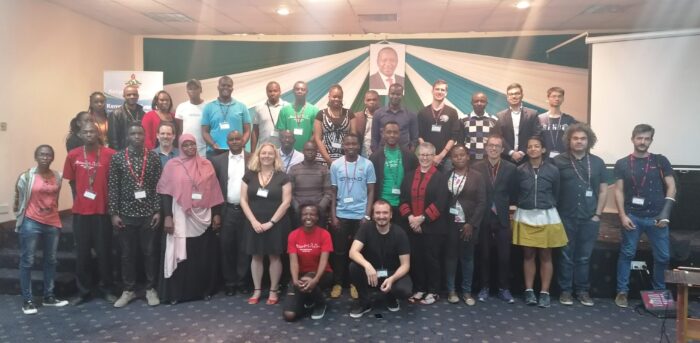
The AI for Development (AI4D) Initiative is pleased to announce the winners of the AI4D-Africa Innovation Call for Proposals 2019.
Sign up and join us to celebrate the winners at Deep Learning Indaba 2019 at the AI4D Network of Excellence Innovation Grant Award Ceremony:
When: Tuesday, 27th August 2019, 7 PM EAT
Where: Interaction Hall – KUCC, Kenyatta University, Nairobi Kenya
The first named individual is the Principle Investigator. Funding for these innovation seed grants is made available with the support of Canada’s International Development Research Centre. To learn more about our Network of Excellence in Artificial Intelligence for Development in Sub-Saharan Africa click here.
Congratulations to all recipients. Follow us at @AI4Dev.
Dr. Abdelhak Mahmoudi
Mohammed V University of Rabat, Morocco
Arabic Speech-to-MSL Translator: ‘Learning for Deaf’
To develop an Arabic text to Moroccan Sign Language (MSL) translation product through building two corpora of data on Arabic texts for the use of translation into MSL. The collected corpora of data will train Deep Learning Models to analyze and map Arabic words and sentences against MSL encodings.
Read about their project: Arabic Speech-to-MSL Translator: ‘Learning for deaf’
Dr. Adewale Akinfaderin, Olamilekan Wahab and Olubayo Adekanmbi
Data Duality Lab, Data Science Nigeria, MTN Nigeria, Nigeria
Using Artificial Intelligence to Digitize Parliamentary Bills in Sub-Saharan Africa
To improve and expand the categorizing of parliamentary bills in Nigeria using Optical Character Recognition (OCR), document embedding, and recurrent neural networks to three other countries in Africa: Kenya, Ghana, and South Africa.
Dr. Amelia Taylor, Eva Mfutso-Bengo and Binart Kachule
University of Malawi and the Polytechnic, University of Malawi, Malawi
A Semi-Automatic Tool for Meta-Data Extraction from Malawi Court Judgments
To develop a methodology for a semi-automatic classification of judgments disseminated by the High Court Library of the Malawi Judiciary with the purpose of enabling ‘intelligent searching’ within this body of knowledge.
Read about their project: Extracting meta-data from Malawi Court Judgements
Dr. Aminata Zerbo Sabane, Dr. Tegawendé Bissyande, and T. Idriss Tinto
L’université Joseph Ki-Zerbo and La Communauté Afrique Francophone des Données Ouvertes, Burkina Faso
Preservation of Indigenous Languages
To initiate a research roadmap for the preservation of indigenous languages through the means of collecting, categorizing and archiving of translation and voice synthesis to perform the automatic translation in official and indigenous languages.
Read about their project: Preservation of Indigenous Languages
Denis Pastory Rubanga, Dr. Zekaya Never, Dr. Machuve Dina, Lilian Mkonyi, Loyani K. Loyani, Richard Mgaya.
Tokyo University of Agriculture, The Nelson Mandela African Institution of Science and Technology, and Sokoine University of Agriculture, Tanzania
A Computer Vision Tomato Pest Assessment and Prediction Tool
Pest monitoring by using a data-driven computer vision technique in directing the extension officers support services across sub-Sahara Africa in a real-time pest damage assessment and recommendation support system for small scale tomato farmers.
Read about their project: A Computer Vision Tomato Pest Assessment and Prediction Tool
Martha Shaka, Nyamos Waigama, Emilian Ngatunga, Halidi Maneno, Said Said, Said Mmaka, Frederick Apina, Simon Chaula, Emani Sulutya, Merikiadi Mashaka
University of Dodoma and Benjamin Mkapa Hospital, Tanzania
Effective Creation of Ground Truth Data-Set for Malaria Diagnosis Using Deep Learning
To create an automatic data annotation tool and ground truth dataset for malaria diagnosis using deep learning. The ground truth dataset and the tool will streamline the development of AI tools for pathology diagnosis.
Dr. Moes Thiga and Dr. Pamela Kimeto
Kabarak University, Kenya
Early Detection of Pre-Eclampsia Using Wearable Devices and Long Short Term Memory Networks
To determine the effectiveness of Long Short Term Memory Network in the prediction of pregnant mothers at high risk of developing pre-eclampsia and the effectiveness of prophylaxis of preeclampsia.
Ronald Ojino and Khushal Brahmbhatt
Cooperative University of Kenya, Kenya
A Public Dataset on Poaching Trends in Kenya and a Study on the Predictive Modeling of Poaching Attacks
To test the feasibility of the deployment of Unmanned Ground Vehicles (UGVs) for automated intelligent patrol, detection, wildlife monitoring, identification across the national parks and reserves in Kenya.
Steven Edward, Edward James, and Deo Shao
Nelson Mandela African Institute of Science and Technology, Tanzania
Improving the Pharmacovigilance system using Natural Language Processing on Electronic Medical Records
To improve the pharmacovigilance system by proposing a novel algorithm for the auto-extract of adverse drug reaction cases from Electronic Medical Records and reduce the time taken and introduce the confidentiality of reporting.
Dr. Tegawendé F. Bissyande, Dr. Aminata Zerbo Sabane, and T. Idriss Tinto
Université Joseph Ki-Zerbo and La Communauté Afrique Francophone des Données Ouvertes, Burkina Faso
Building a Medicinal Plant Database for Preserving Ethnopharmacological Knowledge in the Sahel
To initiate the collection and construction of a medicinal plant database on top of which a search engine and AI-based image recognition for plants to enable scalable search of preserved knowledge.